Straight From The Source: Conversation(s) with ISIS AQUARIAN of The Source Family [Part 1/4]
In part one of our in depth interview with Source Family archivist, Isis Aquarian we talk about the documentary, Jim Baker, Sky Saxon, and preserving a legacy
For those seeking more of a foundation for the subject matter referenced in the following posts, we suggest starting with our companion piece, An Introduction to Isis Aquarian & The Source Family, which can be located HERE.
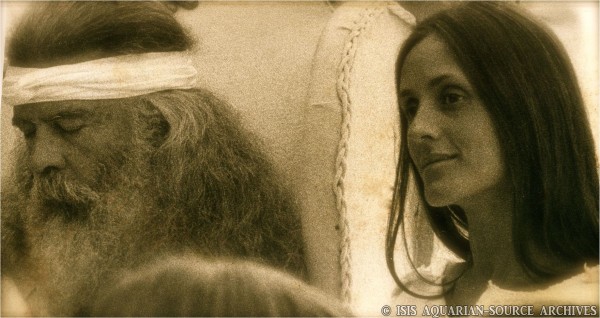
Officially released last year, The Source Family is a mesmerizing documentary which explores the mystical, New Age, 1970s commune of the same name, by addressing the development, aftermath, circumstances, and controversies relating to and surrounding it. As an integral member of the group, Isis Aquarian had, essentially, already documented her time during the family from within. Accumulating a vast collection of photographs, writings/teachings, and recordings (both audio and video), she has managed to successfully preserve the legacy through her personal archives over the last 4 decades–archives that were drawn from extensively, becoming an invaluable resource in the creation of the film, itself. Isis had previously chronicled the life and times of The Source Family; their enigmatic, judo-chopping leader, Father Yod; and the psychedelic rock band that he fronted, in her fascinating and revealing 2007 book, The Source: The Untold Story of Father Yod, Ya Ho Wa 13 and the Source Family. But, by incorporating the archival footage with in-person accounts from those who lived it, filmmakers Jodi Wille and Maria Demopoulos managed to bring that compelling history to life even more, presenting it with an entirely new dimension for the first time.
When the opportunity arose for us to conduct an interview with associate producer/family historian/author/”hippie goddess mother,” Isis Aquarian, the film was in the process of making its way to theaters in 50+ cities nationwide. With a number of screenings featuring Q&As with the filmmakers and select theaters hosting extended runs for the independent doc of up to 2 weeks in length, this was the last big push by distributor, Drag City, prior to the film’s official DVD and soundtrack releases. Theoretically, ours was to be a fairly typical and straightforward interview; the 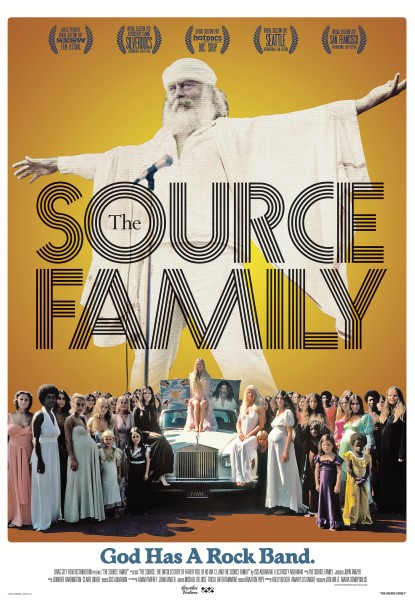 primary intention being to promote the project. After all, that’s why these things are arranged… theoretically. But the story of the Source family isn’t a typical one–it’s not even your typical story of a “cult”–and, consequently, I wasn’t necessarily shooting for most the orthodox interview piece, either.
primary intention being to promote the project. After all, that’s why these things are arranged… theoretically. But the story of the Source family isn’t a typical one–it’s not even your typical story of a “cult”–and, consequently, I wasn’t necessarily shooting for most the orthodox interview piece, either.
Isis would be the first one to acknowledge the fact that there are endless possible interpretations, versions, memories, and realities that exist among the 200-some-odd individuals who, at one time or another, were involved with the Source Family. In fact, she’s actually emphasized the importance of that realization to me a number of times and, never discounting their validity, has stressed that she is only capable of offering up her own personal truths and experiences to the world. As with her book before it, The Source documentary features a number of these differing, even conflicting, perspectives; their inclusion both lending itself to the credibility of the project and resulting in a more well-rounded final product. Embedded with such loaded topics as mysticism, cults, and polygamy, it’s pretty much a given that most people will enter into the film with some level of presumption, one way or another. If there were nothing other than enthusiastic, agreeable family members on display, it could easily come across like a bunch of spaced-out, hippie wingnuts, preaching about the importance of holding hands and wheatgrass. But, if there were strictly analytical Anthropologists and detractors welcomed to voice their opinions, it would be difficult not to view the film as possessing a very clear and focused agenda aimed at discrediting a fairly likeable, spiritually-minded, and progressive commune. And while I do believe that the filmmakers approached the project from the best angle available, and with tremendous results, there will always be an inherent and unavoidable by-product in not forcefully shoving your own personal viewpoints down the audience’s throats: when there are conflicting points of view, most viewers will give more credence to the statements which come from the interviewees that they feel are the most like themselves. Would a former Source Family member-turned-business tycoon be considered a sellout or a success story? Did they benefit from “wising up” and abandoning their former life, or is it possible that the knowledge that they obtained through those past experiences might actually directly inform how they’ve managed to achieve so much in their current lives? The same accounts viewed by two different individuals can yield two very different conclusions.
With a subject this captivating and dense, it’s difficult not to be intrigued, but it can also make it far too easy to remain in a place where you’re merely skimming the surface. It’s mindblowing enough to discover obscure improvised psychedelic rock music created and pressed independently by a cult leader and his followers, even before a google image search exhumes vintage photographs of the massive 6’3″ bearded guru straddling the hood of a Rolls Royce in a medallion, vest, and knee-high moccasin-style boots, while flanked by his long-haired “sons”/bandmates brandishing electric guitars. Or, how about the shot where a seated Yod–sporting a tailored, all-white suit, fedora, and cane–is surrounded by a (Jim) baker’s dozen of women in delicate flowing gowns? Just the photographs alone suggest their own powerful narrative. Those who continue their research into the book and/or documentary are dazzled by tales of movie stars, hang gliding deaths, underage runaways, and the occult (in other words, the “exciting” stuff). The layers are peeled back, but, even with the care put in to divulge the greater purposes within the group and obtain detailed personal accounts, the novelty of something so foreign to most of us can outshine the importance of the human element, with the various individual voices expressed finding themselves confined to one of 2 very distinct and limiting categories: the far-out believers and the closed-minded cynics. If I wanted to delve even further, I knew that the clear solution for me would not be to casually seek out and briefly touch on a variety of different opinions, but to really focus on one specific source–the one that has continued to make the legacy a priority, throughout decades where being open about ones involvement in the family was much more likely to be greeted with negativity and judgement than any level of reverence. Now that the groundwork had been laid and so much of the necessary details had been exposed, I wanted to understand the motivations behind them on a more human and emotional level. I wanted to understand it on a personal level, from an actual person.
![The Council of Women [Isis - bottom right]](http://monsterfresh.com/wp-content/uploads/2013/09/suit-and-cane-women-marked-600x409.jpg)
[Isis – bottom right]
Also to my benefit was the fact that neither Isis Aquarian or myself place too much importance on the concept of time–her, no doubt, because of an extensive history with meditation and studying spirituality and, myself, due to the ridiculous amount of hallucinogenics that I used to shove into my head in my youth. In fact, for that first 30 minutes of us speaking, I was pretty much dominated with little control over the direction at all. In the end, however, our conversation stretched to a full 2 hours. 2 days later, she called me and we spoke for another 45 minutes. Since then, there have been countless emails and instant messages exchanged. Whenever I need clarification, she’s been available to provide it, but the issue has become that, every time I get closer to feeling like I have a grasp on this beast, a whole new pathway, storyline, or layer exposes itself. I was unsure how to present this piece and have reworked the idea a number of times over the last couple of months. In the end, I’m now convinced that the only way to come to understand it, and understand her, as I feel that I might, is to read the actual transcription of that original conversation just as it unfolded. Divided into 4 separate installments; random insights, clarifications, and elaborations from our subsequent interactions will be inserted; both into the introductions and bodies of these segments, whenever I feel that they may be of benefit.
As always, thanks for reading. I hope that you will find this all as fascinating and rewarding of an exploration as I have and do.
-Dead C
The Interview
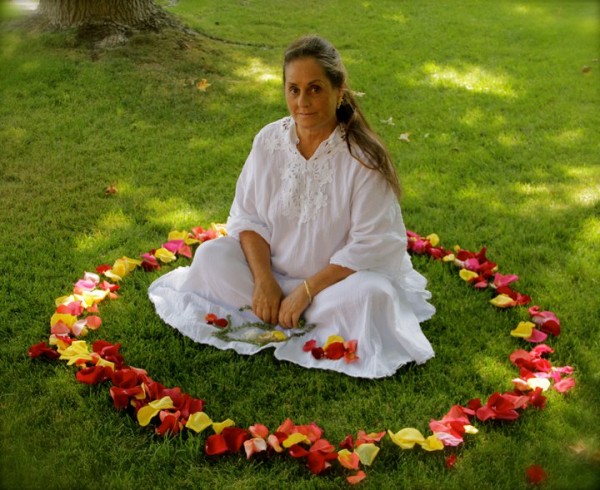
ISIS AQUARIAN:
Hello.
MONSTER FRESH:
Hello, is this Isis?
Yes.
Hi, this is Christopher. I’m supposed to conduct an interview with you
Okay. Hang on one minute, I’m writing down a thought.
Okay.
K?
*10 seconds later* Alright, how are you?
Good. How are you?
I’m doing really well. Where are you calling from?
Seattle.
Oh, yep, that’s right; I knew that. Perfect, perfect. I love Seattle.
I was actually reading the book last night that you put out in 2007.
Oh, thank you.
I was going through some [of the stuff about] the Love family and, I also was online and saw that there’s a copy of [Father Yod’s book] Liberation out here somewhere. I just randomly came across it and it said that there’s a copy at a library up here.
Oh.. My… Gosh. I love hearing stuff like that. Do you know the designer Michael Cepress, by any chance?
Umm… I’ve heard of him. And actually, I have someone that’s recently started writing for the site, and I had mentioned you [to him], and he said that he knew somebody that was working with you on some level, I guess, to deal with fashion.
Yeah, well Michael—we were going to do something a couple years ago, and he just decided that he should just stick to being his own designer. And he’s brilliant. He just had his show and he’s just off the charts.
Yeah, I recently heard his name around. I’m kind of in a weird bubble, in some respects, to what’s happening. I kind of just migrate towards whatever interests me.
Well, he also teaches. He’s young, but he teaches at the University [of Washington]. I know that he had me out there a few times for his class. But, um… anyhow, I just wondered.
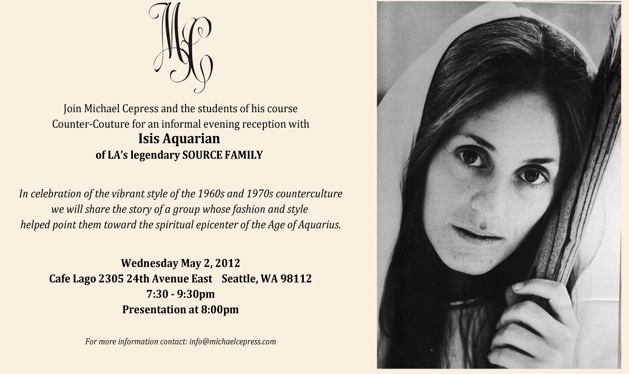
Actually, I originally thought that you might be coming out to Seattle—that was the original proposition, that you might be here for the screening of the film.
I know.
Did you make it out to a lot of the screenings—to the stops–and, if so, I was wondering what you’re finding the reactions to be.
What happened is that I’ve been traveling with this film for 2 years, and I’ve done Seattle several times with it. This last one I did not get to do because we were doing LA at the same time. And LA was our, you know, LA premier, and it’s home ground, and that was really important, because that’s where it all started.
And a lot of people came out for that, didn’t they?
Yes, yes. Oh my god, it was amazing. The Standard Hotel on Sunset is very famous, so a lot of people found out that we were doing it there and a lot of people came just because of that. You know, just like, “Wow.”
What’s the general reaction that you’re getting from people?
We had one guy who is “in the know,” for sure–he does a lot of premiers and he goes to a lot of screenings; his wife is a very famous producer. Actually, one of her last films was Django with Quentin Tarantino. She’s actually done a few films with him. But, he said this was the best premier that he’s ever been to–the Source one. We’ve had some reactions like that. They did the whole night with, whatever, Source from the family. It was all over the place; they made it like a Source Disneyland.
And the film was resonating with a lot of people, do you feel?
Yes, I do. Some of the reviews we’re getting are mixed, but they always come away positive; they can’t help it. Like, they try to throw something in there about Manson, or they try to throw something in there about the sex, the underage kids, or the word “cult,” but they just can’t help it, they’re so fascinated with the film, that they usually—always, will end it with “But…” *laughs* “…it’s a really good film.”
[vimeo]http://vimeo.com/58953915[/vimeo]
Well, the issue is that they’re trying to correlate it to something that they understand, but there’s so much that differs.
Yeah, exactly.
I mean, from the beginning, Baker had money and he provided so much, so you can’t really take that angle and… it’s hard to–
Say he ripped us off.
Yeah. And another thing that I find really interesting is that it seemed more like a beacon for people who were seeking, versus somebody that was hunting other people down. Do you feel like [the family] kind of formed naturally around him and that he just took his role [within it]?
It was a beacon, but it was a very special specialized beacon, because everything has a frequency.
Do we have time to talk?
I do. I don’t know how much time you have. I could talk forever.
I have time.
Okay.
In fact, I like to follow up with an email, in case there’s things I don’t really want to spend time on, but I want you to know.
That’s great. I don’t really operate like a lot of people do. I kind of operate in a manner that’s not as conducive to an internet format, where I do lengthier interviews. I don’t really like to jump in and ask 2 questions and be uninformed and move on. So, I’m just trying to work within whatever works for you, but I have endless questions.
Well, I pretty well am what they call a stream of thought. So, I can go anywhere at any time and stop, or go, and just see where it takes me. It’s pretty well guided, I don’t even have to think about what I’m saying. It works really well.
Okay, good. That’s kind of how I am and that’s why I’m glad. I was told, you know, “you have a half hour. Call at one.” I’m trying to work within the constructs of time—of human time—but…
Well, this plane is the only plane [where] time exists, and we lived outside of that in the Source family, and that’s how we existed. We lived by spiritual law over man’s law and we lived the reality–it’s called The Eternal Now. And that was one of our main edicts, was to live “in the now” with everything. That takes you out of time. And so, we did not live in time and that’s why, when the family dispersed, we all went, “What the fuck just happened?” Excuse me, but it’s like we had to come back to time, and man’s reality. And it kicked us in the ass, I’ll tell ya.
Yeah, I mean, about that time–
Wait, wait, wait, wait. First of all, I want your phone number, if you don’t mind. Or, a number.
Yeah, I can give that to you. Are you ready…
*I give her the number*
Okay, and then what’s your email?
*I give give her that too*
Okay, one more question. What is Monster Fresh? Is this like a blog? A magazine…?
*At this point, I attempt to overly explain my abstract interpretation of what I personally believe that the site is supposed to encompass, while I could have much more effectively just explained that it was a website and moved on.*
No no no… that’s good. Everything’s good. And that is the beauty of what’s happening right now with technology. Oh my god. You can sit in solitude and get your concept out within 3 seconds all over the world. It’s amazing.
And it’s so random. Basically, I try to see what something is and then I try to see how I can use it [for myself]. Because, you know, things are presented to you in a certain structure, “This is what this does.” Even how a chair is a chair; someone sits on it, until someone stands on it and uses it to change a light bulb. So, I’d rather take this thing that exists around me and is kind of confounding in certain ways, and [attempt to] understand what it’s capable of.
And it’s like, you never know who it’s gonna reach. I’m 71, Christopher, and I have been utterly turned around since doing this work and dealing with the public now, because so many of them are the younger people, and just seeing how amazing what you’re doing [can be] and who it reaches and where that takes it. Never before in time has anything like this been able to happen. And I totally am thrilled with it all. And I’m finding that I’m connecting with these people and we don’t see each other’s age; we see soul-to-soul, and that’s the way we did it in the Sixties and Seventies. It was like a portal opened in the Sixties and Seventies. And it was a frequency that hit this planet and a lot of us merged with it and walked through that portal, and that’s how we could do what we did–leave our homes, hit the streets. We didn’t ask people about their pasts; we didn’t care. It was in the now and “who are you ?”on a soul to soul level–what are we gonna do now with it? And people did not relate to your color, how old you were, any of it; if you had money–if you didn’t. I’m sure some did, but the majority did not. Well, that’s happening now. I’m finding that on my travels and it’s utterly amazing… utterly amazing. Especially, with the younger generation.
You asked me about traveling, it’s been awesome. Literally, awesome, and it started with the book—working 7 years on the book with my Source Family partner, Electricity Aquarian, who lives on Kauai. And what happened was—can I just talk?
Oh yeah
Okay. Keep your questions handy. I might answer them already, but if not, definitely [hold onto them].
We were—there was no Source Family, it’s something that happened 40 years ago, and we were pretty well flatlined. We were dead, nobody knew who we were, what we were doing. Nothing about the legacy, nothing about our teachings. Well, the music—some of the music had always been out, or it was underground, had an underground cult following, but nobody knew who anybody was or how to get in touch with them. “Who were these people?” They loved the music, but they had no idea who these people were, anything about them, or any way to connect with them. Are you finding that to be true?
Um… yeah. This is one of those things where–I’ve known about this over the years…
Exactly, well people have known about it for 40 years.
Well there was the reunion that happened—the tour—and we had somebody cover that. A friend of mine went to the Nectar Lounge in Seattle and saw the Ya Ho Wha 13 show and then came back immediately and wrote about it that night, because he just called me and was like, “I want to write something on the site.”
Oh, perfect.
And I also know people that have collected the vinyl, and I was curious about when you first noticed that there was, kind of, a resurgence in the music.
Okay. I’ll get to that
Okay.
Because, it was all because of me that that happened. It was all because of the book, actually.
Didn’t Sky Saxon (Source Family member and frontman of The Seeds) put out something in like, ’98? Like the God and Hair [box set of music].
That started the protection and that started the Source Foundation. So, let me just–I’ll get to it, okay?
Okay
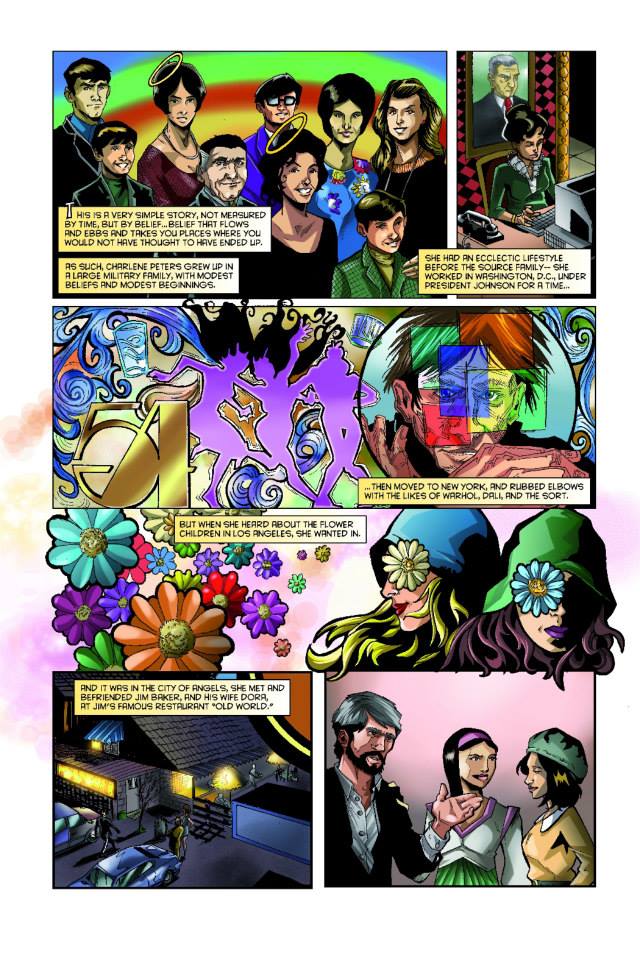
as “illustrated” in the Father Yod and the Source Family comic (Bluewater Prod.)
So, it basically started with the fact that… I was one of father yod’s 14 wives. But, when I came into the family, I was the only one that knew Jim Baker. I knew Jim Baker at the Old World restaurant, when he was with Dora, his wife at the time. She became my friend. And this was before he started The Source [restaurant]. I did not connect with Jim Baker. I mean, I loved him. You know, what was there not to love? He was the ultimate animal man, but I was seeking something spiritually and I could not find my thread. I couldn’t through Budhism and the Ashrams that were happening in LA, big time, with the yogi vibration. It’s like everybody was searching for their beacon, as you called it. I just could not find mine. I ended up living in a studio and became engaged to a very famous rock photographer (Ron Raffaeilli).
And, I had lost touch with Jim Baker for maybe a year, year and a half, and I heard that he had opened a new restaurant called The Source; he had found the spiritual path of Yogi Bhajan. And we needed models, so I said, “Well, I’m gonna go down to the Source and get some Jesus people for the poster and reconnect with my old friend Jim Baker.” So, I went down to the Source and out came this man who looked like Moses. He definitely had started his evolutionary process out of Jim Baker into a more spiritual person—you know, as Father/Father Yod. So, I joined the family. I came in with camera equipment from the studio and filmed the first birth in the family. So, this started my journey as the historian and the archive keeper and he (Baker/Yod), right away, said to me, he said, “We have done this many lifetimes together.” And he said, “These are commitments we made, before we even incarnated. That you are going to do this work with me and have my back.” And that was my thread with him, through the family, up to this moment. So, I remained after the family—my thread with him was just never broken. I actually remained true to him as his wife, and the historian, and the archive keeper. So, in that process, I became what they called an Aquarian nun. Well there’s nothing new about being a nun or a monk, right?
Yeah
So, that concept is not a foreign one. But, within these last 40 years, or 30 years, I had all the archives, but they were dead. They were the dead archives, and I lugged them around, protected them, and saved them. When the family dispersed, nobody took anything. They just all kind of turned around, walked out, and left. There were a few people [who] took a few things, but not really.
Yeah, I was curious about that. That’s interesting.
And nobody asked for anything. Like, everybody knew I had everything. Except the musicians–I will tell you this, the musicians did take some of their reel-to-reels, but over the years, they threw them away. It’s like it got to a point, after a few years, that everybody thought, “Well, we’re in a new life, it meant nothing, it’s never gonna go anywhere, none of this means anything, and I don’t want it.” People actually threw what they had away, including the music and the musicians. So, as time went on, I went, “Oh my god.” You know, “Something has to be done.” I’m not a writer. I’m also not a singer. But, I tried to get 5 people to do this book, about 13 years ago. I begged them. I said, “I’ll give you anything you want from the archives. I’ll help you, but this legacy has to be saved. And you know we’re all getting old.” I couldn’t get anybody to do the book. They didn’t want to, they didn’t have time… People did not want to come out of the Source closet. Are you hearing me?
Mmhmm
People didn’t even want their names used—their Aquarian names. And even Electricity, who ended up as my Source partner, he said, “I’m gonna do this book with you, but I don’t want my name used.” He goes, “I’m a real estate broker, here on the island; I don’t want people to know who I am.” So, this is what I was dealing with. I’ve always been out front with who Father was—his picture’s always been in my home—and [with] who I was. So, I said, “Okay. Whatever, just let’s do it.” So we worked 7 years and we did the first book that you are now reading. And, as soon as we finished it and made 250 copies… We had the Source Foundation by the way, because Sky Saxon—“Arelich” (in the family)—took the albums to Captain Trip (Records) from Japan and bootlegged them. He put them out. Nobody got anything from that.
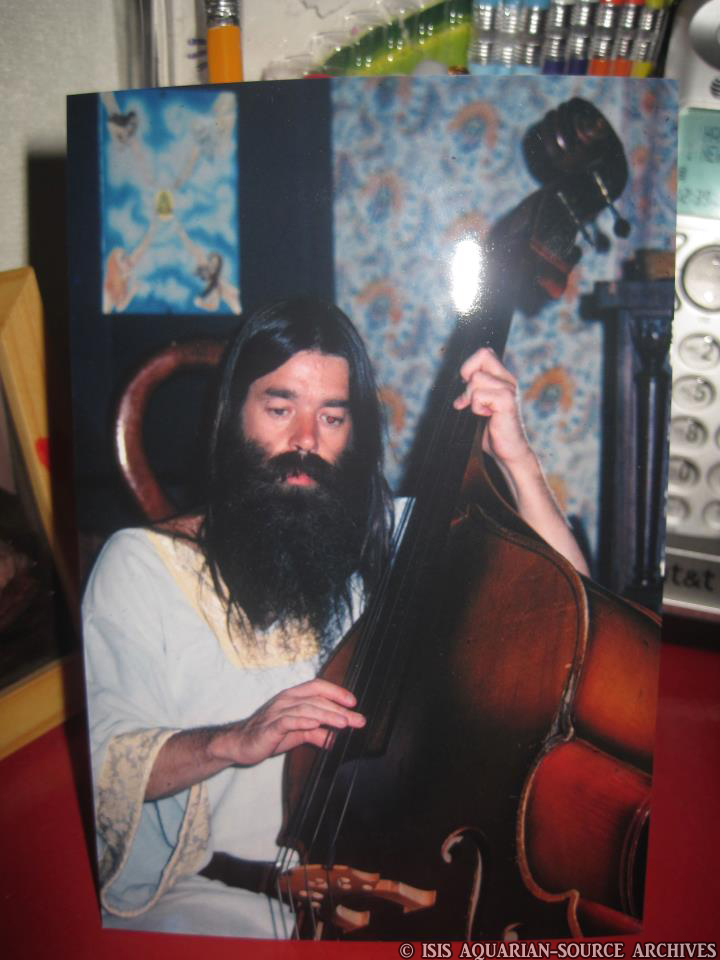
I’m sorry, I just want to clarify, because I was confused about that. Did you have those recordings, or– Where did he get them from?
No. One of the brothers in the family had some of the vinyls. I have the vinyls too, but he knew better than to ask me. So, he asked one of the brothers and he gave them to him. You know, this is before anything was even done. The boxset came out and it was beautiful. It’s like, I couldn’t even get mad, because it was so beautiful. And, our music was out. It was all in Japanese, but it was like the start of something having to do with saving the legacy and the archives. Arelich—you can’t get mad at Arelich/Sky, because he doesn’t have a mean bone in his body. He doesn’t think that way. I’ve never heard him say a mean word about anything or anybody. He’s one of the sweetest souls ever. So, you know, there was a certain amount of innocence in what he did. He just needed money and these people approached him and he wanted to do it. He thought it was a great idea.
Had you been approached about things, before that?
No. Not really. Or, the music. ‘Cuz, like I said, I wasn’t one of the musicians. I didn’t really have anything to do with the music. So, when that happened, Electricity and I, who had already started working on the book, went, “Wait a minute, we have got to figure out a way to protect our stuff.” So, we formed The Source Foundation with a board.
And basically, by “protect,” you mean just making sure that, if it’s gonna come out, that you have control of the context in which it’s released?
Yeah. [To] make sure that there was one place people knew that they could go to find out about us and that things could go through the foundation, if anybody did anything, like a central area people could go to. We said, if anybody’s doing a project, put it on the Source Foundation; that’d be one place people could go to to find stuff. You know, and to protect it. What we did with The Source Foundation—you now, The Source Foundation gets a percent, and then they get a percent; and same with the musicians, with their music. So, the musicians–because they didn’t get anything anyhow, from that whole thing with Arelich (the boxset release), and nothing was happening, and nobody even had the music, and they went, “This is music from 40 years ago, we don’t care.” So, they signed and they get a very big percent for whatever we do with this family music from 40 years ago. But, it’s protected through the foundation. So, the thing is, like I said, we were flatlined, we were dead. Nobody cared. Nobody was doing anything. Nobody was coming out of the Source closet. We had just self-published our book, made 250 copies, and a lady named Jodi Wille called me from L.A. She said, “Oh my god. I can’t believe I found you. How did I not know about you people? First of all, I just found the boxset and I can’t find anything on anybody. Who are you people? I want to do a book. I want to do a book on you.” So, I hysterically laughed for 15 minutes and then said, “Well, we just did a book.”
*laughs*
She said, “I’m coming. I’m flying to Hawaii, right now. Will you see me?” And we said, “Of course.” She was here like the next day, from L.A. And she went through all my archives and went completely berserk. And, she looked at what we did with the book and she said, “This will never fly for the public. I’m a publisher. I need to re-edit it, redo it, rework it, and let me publish it.” And we were thrilled. We said, yes.
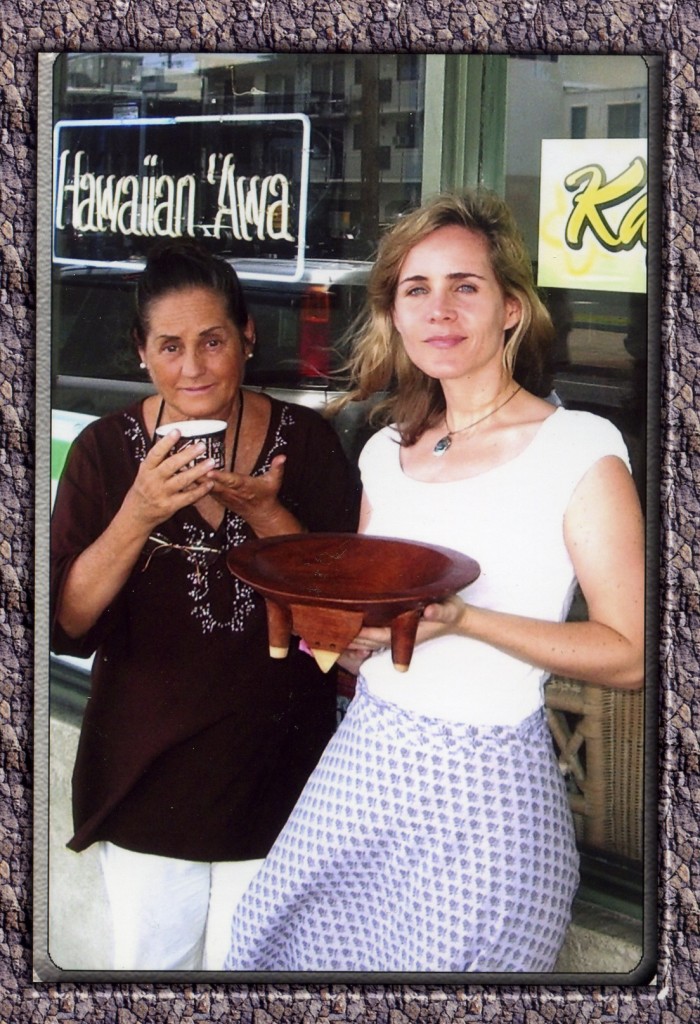
Yeah, I knew she worked on the film. Did you feel it immediately that she [was right for this]? Because I know that this is really sacred material for you.
It was immediately. And people ask her in her interviews, “How did you gain the trust of Isis that she handed over all of her sacred archives to you?” And it was a no brainer, for both of us, because I looked at her and I said, “Okay, you’re a one stop shop. You’re gonna be my Source partner, and anything we’re gonna do, you’re gonna do. This isn’t gonna be a one hit wonder.” And that’s what we agreed to. So, I have 2 partners. I have a Source Family partner: Electricity. We did the book, we run the foundation, and we’ve done the teachings that we’ve put out, and No More Secrets (teachings). And I don’t know if you’ve ever been to Yahowha.org, but it’s done very well and it’s got a lot of good stuff on it. Have you been to it?
I’ve been through parts of it, because it will lead me somewhere else, and then lead me somewhere else.
Oh, I know. What I’m saying is there’s a place for somebody to go for all that; get in touch with us, find out who we are, see some photos, see some teachings, be able to get stuff. But, with Jodi, this lead to the documentary, absolutely, because she said, “I need to start talking to some of the Source people to fill this book out and get more of their input too, and, you know, back up some of the stuff you’re saying.” So we started meeting some of the Source people and doing a little bit of traveling, and we just kind of, at one point, said, “Wow.” I said, “I should be filming this, behind the scenes. Wouldn’t this be a good bonus disc? You shooting people and people just sitting around talking.” This led to the documentary—doing the full on documentary about it. It took us a few years, but we finally got professional producers, backers. Jodi came in as a co-director and co-producer with Maria (Demopoulos), who works in the film industry and has done work. So, those two came in as directors and producers and I was associate producer and I had some type of creative control. They used my archives and that’s what made the film; my home movies, my photos, tapes of Father actually talking.
[All images used courtesy of Isis Aquarian-Source Archives]
The Source Family documentary is available now on DVD from Drag City records
CLICK HERE TO READ PART 2